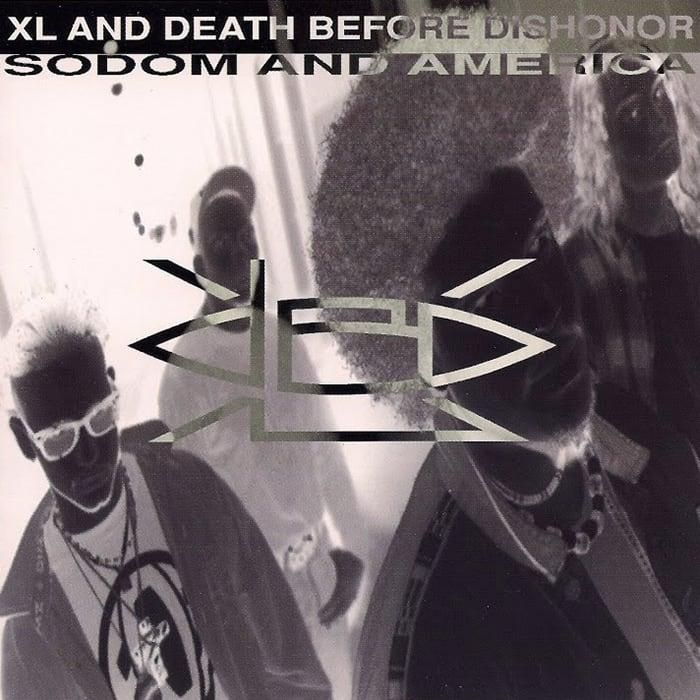Sodom and America by XL & Death Before Dishonor (Review)

I’ve long believed that indie/alternative Christian (aka “Chrindie”) music in the ’80s and ’90s existed in a parallel universe that was largely ignored by both the mainstream secular music industry and CCM (contemporary Christian music) circles. While this undoubtedly sucked for the artists who occupied this universe with regards to getting people to discover and hear their music and, y’know, making a living, I do think it lead to a level of creativity and artistic diversity that — if I’m being totally honest — I miss these days.
I think the artists in that universe knew the rest of the music world didn’t care about them at all, and subsequently, they had little concern for rules or conventions. Instead, they just went wherever the muse took them, for better or worse, with the result being a treasure trove of fascinating music that unfortunately, most people — even and especially fellow Christians — remain wildly ignorant of to this day.
Sodom and America, the debut album from XL and Death Before Dishonor, is a perfect example of this. A rapcore album featuring former members of esteemed Christian punk and metal groups (e.g., The Crucified, Deliverance) and produced by one of Chrindie’s most famous figures (Gene Eugene), Sodom and America was released on Brainstorm Artists International, a seminal Christian label that dabbled in a little bit of everything: hip-hop (S.F.C.), alt-country and roots rock (Lost Dogs), speed metal (Deliverance), punk (Undercover), and whatever it was that Daniel Amos played.
As you might guess from the title, Sodom and America is not the subtlest of albums as it tackles topics including materialism and greed (the title track), racism (“Die (That Settles It!)”), and sexism and pornography (“Woman”). And by “not the subtlest,” I mean “put into a chokehold and then bash your head in with an aluminum baseball bat.” One minute, XL is decrying satanic influences in American society (“And now you’re askin’ me why am I so militant?/‘Cause I see the devil’s hand on this continent”), the next he’s ruminating on matters of salvation (“How many people love Jesus? It’s hard to tell/We’ll find out in heaven or hell”).
And then there’s “Die (That Settles It!)” and its violent condemnation of racism. His line about there never being a black president may evoke a wry smile now, but then he ends the song with a lyric that probably raised the eyebrows of distributors and Christian bookstore owners back in the day, and is still pretty shocking: “If racism was a man and I had a twelve gauge/I’d shoot him in the head in the Lord God’s name.”
Christian artists weren’t supposed to traffic in such bluntly violent imagery — or so nice, conservative CCM had us believe. Death Before Dishonor became one of those albums that made me and my fellow white, middle class youth group friends feel doubly rebellious: not only was it too blunt and gritty for our parents and church leaders, but it would also confound our secular friends because it was so explicitly Christian.
The only song on Death Before Dishonor that hasn’t aged well is “Woman.” Ostensibly a plea for women to find their value in being God’s children rather than physical beauty or the approval of men, “Woman” goes down some weird lyrical paths. When the song begins, the titular female is sleeping around, but by its end, she’s become a lesbian, a porn star, and to top it all off, “a high priestess in a satanic cult.” I’m sure “Woman” seemed pretty edgy back in 1993, but in light of #MeToo and #ChurchToo, its edginess feels kind of silly, even trivializing.
Musically, Death Before Dishonor slams. In combining rap and metal, XL doesn’t dilute either aspect. He may not be the most gifted MC, but XL’s lines drip with conviction. Meanwhile, the album’s packed with enough massive riffs to leave any thrash metal fan in a state of bliss. “Sodom and America” makes you want to start a pit in your living room, with Deliverance’s Jimmy Brown throwing down a screaming solo. Adam Again’s Greg Lawless lays down some scorching licks of his own on “Don’t Fool Yourself” and when the chorus on “Die (That Settles It!)” kicks in, I dare you to not start headbanging with abandon.
For many, rap and metal seem like strange bedfellows, and no doubt, when I first mentioned this was a “rapcore” album, some of you had flashbacks to the blighted days when Kid Rock and Limp Bizkit saturated the market. XL addresses this “controversy” on “Afrocka,” the album’s most light-hearted moment: “Kickin’ hard rock and rap at the same time/Smilin’ and profilin’ while I’m dropping dope rhymes/Got everybody trippin’ out on what I’ve done/Sayin’ XL’s selling out/Man I ain’t the one.”
Sodom and America can seem dated at times (e.g., the aforementioned “Woman”), and its rap/metal hybrid no longer en vogue. But to these ears, it’s a fascinating — and riff-laden — time capsule nevertheless. I am glad that artists like Sufjan Stevens, David Eugene Edwards, Bill Mallonee, and Jason Martin have broken through the sacred/secular divide, and shown that artists of faith can be artistically and aesthetically compelling. However, I do miss the art that was created when there was a truer underground Christian scene, one relegated to the most distant edges of Christendom, its artists working together in surprising ways because nobody else had their backs. There was a vibrancy, an intensity, and a “don’t give a flying leap”-ness about it all that comes rushing back when I listen to Sodom and America even now, nearly three decades later.